Some current members
Anne Davis - Professor of Mathematical Physics
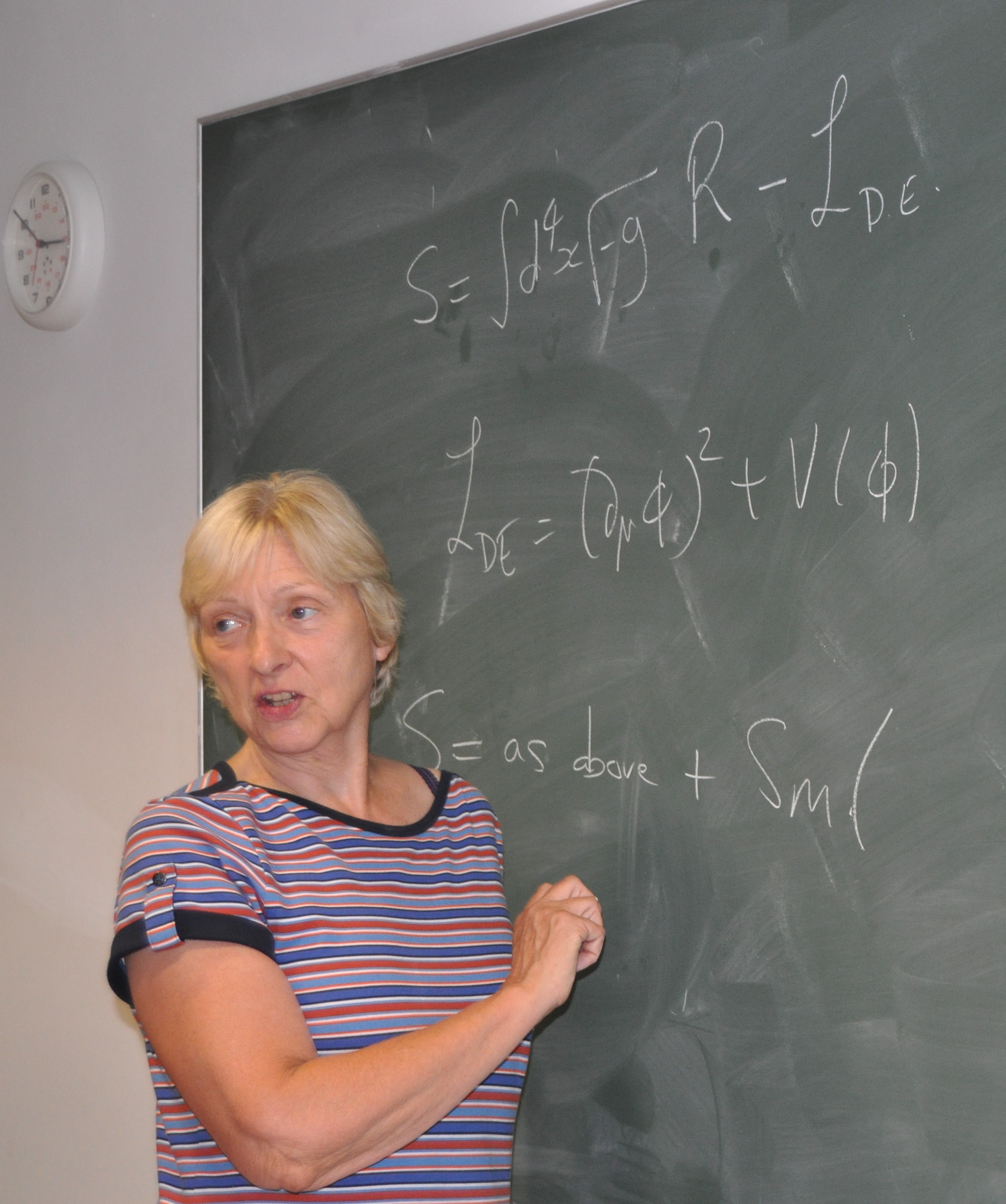
Anne Davis was the first woman to hold a Professorship in Theoretical Physics in DAMTP, in 2002. She spent time at Durham, Imperial College, CERN and Princeton before arriving at DAMTP, first as an SERC Advanced Fellow, in 1983. She was elected a Member of the Academia Europeae in 2009 and elected to the Professorship of Mathematical Physics (1967), one of DAMTP's longest-established Professorships, previously held by John Polkinghorne, John Taylor and Neil Turok. Professor Davis, whose research is in the area of theoretical cosmology, has been one of the leading proponents of the chameleon particle theory that potentially accounts for the observed acceleration of the universe which presents a major cosmological puzzle.
Natalia Berloff - Professor of Applied Mathematics
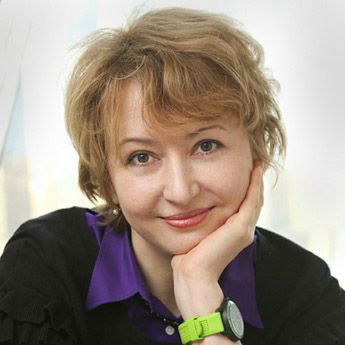
Natalia's research is in the area of quantum fluids, superfluid turbulence, coherence in non-equilibrium quantum systems: Bose Condensation of excitons and polaritons, magnons, atomic gases, superfluid helium, strong light-matter coupling in solid-state and atomic systems and driven quantum systems.
Natalia graduated from the Department of Computational Mathematics and Cybernetics, Lomonosov Moscow State University and received her PhD in Mathematics at the Florida State University. She worked as a postdoctoral fellow and subsequently as an Assistant Professor at the Department of Mathematics, the University of California, Los Angeles, until 2002. Since 2002 she has been a faculty member (Lecturer, Reader, then Professor) at the Department of Applied Mathematics and Theoretical Physics, and also a Fellow of Jesus College. In 2013--2016 Natalia served as the Dean of Faculty and the Director of Program in Photonics and Quantum Materials at the newly founded Skoltech Institute of Science and Technology. She is a recipient of the Dwight B. Goodner Fellowship (1995), the UC President’s Postdoctoral Fellowship (1997), an NIH/NHGRI Career Development Award (2001) and the Pilkington Prize (2005).
Julia Gog - Professor
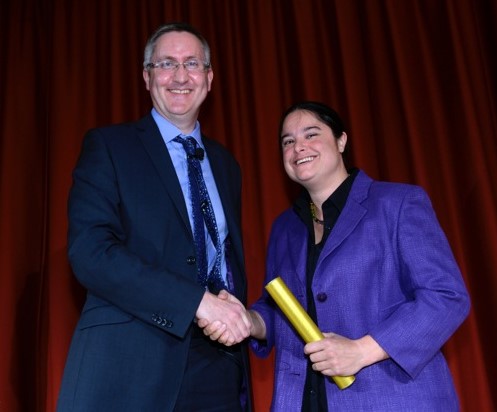
Julia Gog research is in the area of the dynamics of infectious diseases, with particularly interest in influenza. An example of her recent work is here. Julia came to Cambridge to read mathematics in 1994 (Trinity College). During Part III, she encountered the area of mathematical biology, and took the decision to move to the Department of Zoology, Cambridge to pursue a doctorate in modelling infectious disease dynamics. In 2002, she joined Queens’ College as a Research Fellow and in 2004 she became a Royal Society University Research Fellow. Both of these fellowships gave her valuable time and freedom to expand her research interests and to establish herself at the interface between mathematics and biology, working with both theoreticians and experimentalists to understand infectious disease.
As well as her role in DAMTP, Julia is the Director of Studies in Mathematics at Queens’ College. She is pictured receiving the Pilkington Teaching Award from the Pro-Vice Chancellor for Education.
Carola Schönlieb - Reader
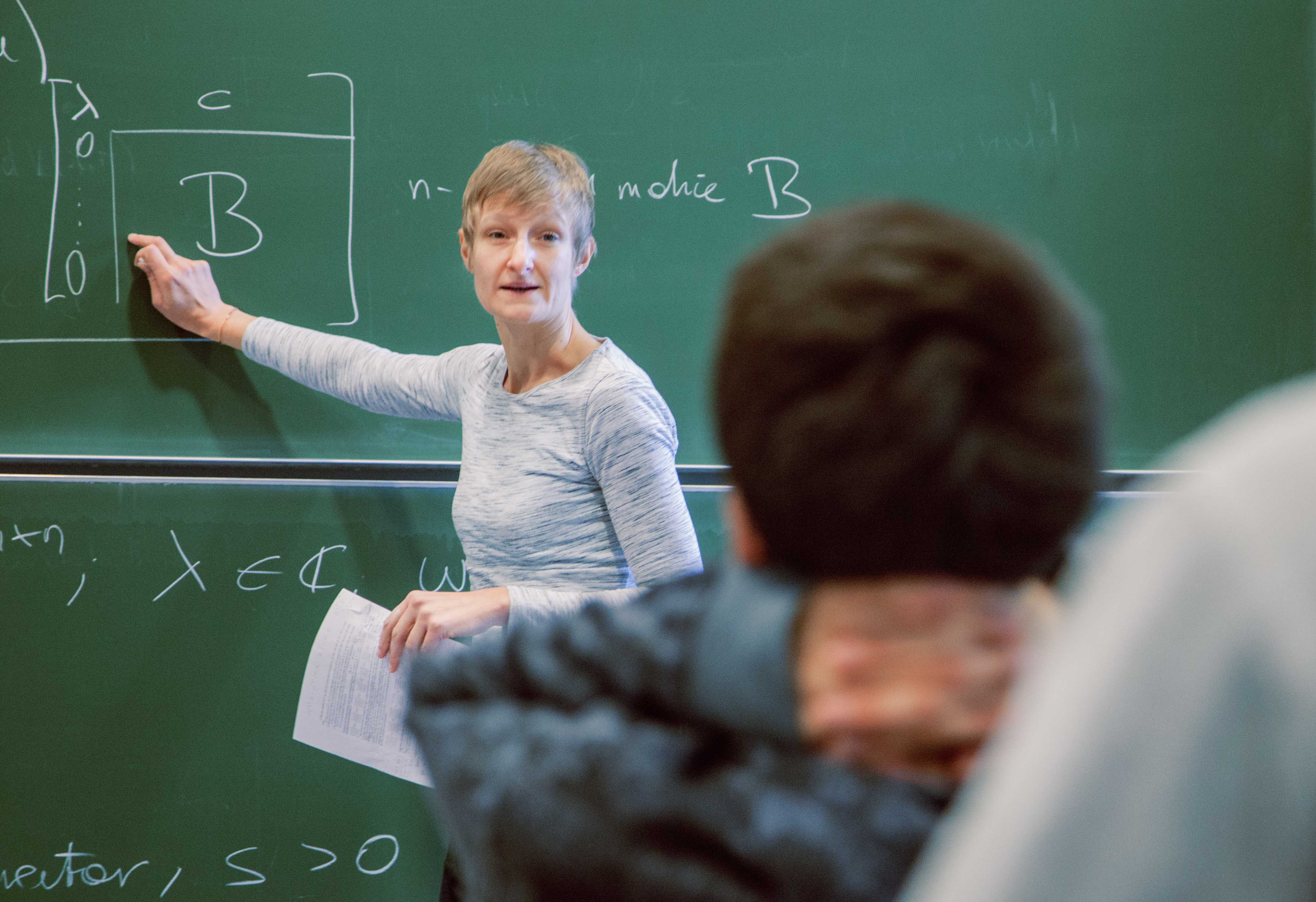
Dr Carola Schönlieb studied for a Master’s degree in Mathematics at the University of Salzburg, before coming to Cambridge to complete her PhD. After completing her PhD she worked as a research assistant in Austria and Germany, before returning to Cambridge as a Lecturer in Applied and Computational Analysis. Since November 2015, she is also the Director of the new Cantab Capital Institute for the Mathematics of Information (CCMI), which is a collaboration between DAMTP and DPMMS, and accommodates research activity on fundamental mathematical problems and methodology for understanding, analyzing, processing and simulating data.
Her research interests include nonlinear PDEs and computational analysis, with applications in digital image medical imaging and signal processing. In 2016 she was awarded the Whitehead prize by the London Mathematical Society "for her spectacular contributions to the mathematics of image analysis and inverse imaging problems".
Helen Mason - Reader
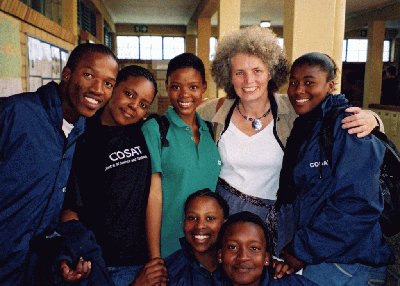
Helen Mason has been at DAMTP for over 35 years. She obtained a BSc and PhD at the University of London. She is a Fellow of St Edmund's College and was Senior Tutor from 2006-2011. Helen's field of research is solar physics, in particular the ultraviolet and X-ray spectrum of the Sun. She has worked on many joint UK, NASA, ESA and Japanese space projects (Skylab, the Solar Maximum Mission, Yohkoh, SoHO, Hinode and SDO). Recent solar space observations have completely changed our view of the Sun. Helen has always been keen to convey her passion for solar physics to the general public and to school students. Her Royal Institution lecture can be found on YouTube. She has also participated radio and TV programmes, most recently the BBC4 program 'Seven Ages of Starlight'. She has produced an educational web site called Sun|trek which is used extensively in the UK, USA and worldwide. Her outreach work was recognised in 2010 when she was nominated as one of the six 'Women of Outstanding Achievement'. In 2014, Helen was awarded an OBE for her services to Higher Education and to Women in Science, Engineering and Technology. She is pictured with some South African students during outreach work as part of the African Institute for Mathematical Sciences Schools Enrichment Centre (AIMSSEC).
Orsola Rath Spivack - Senior Research Associate
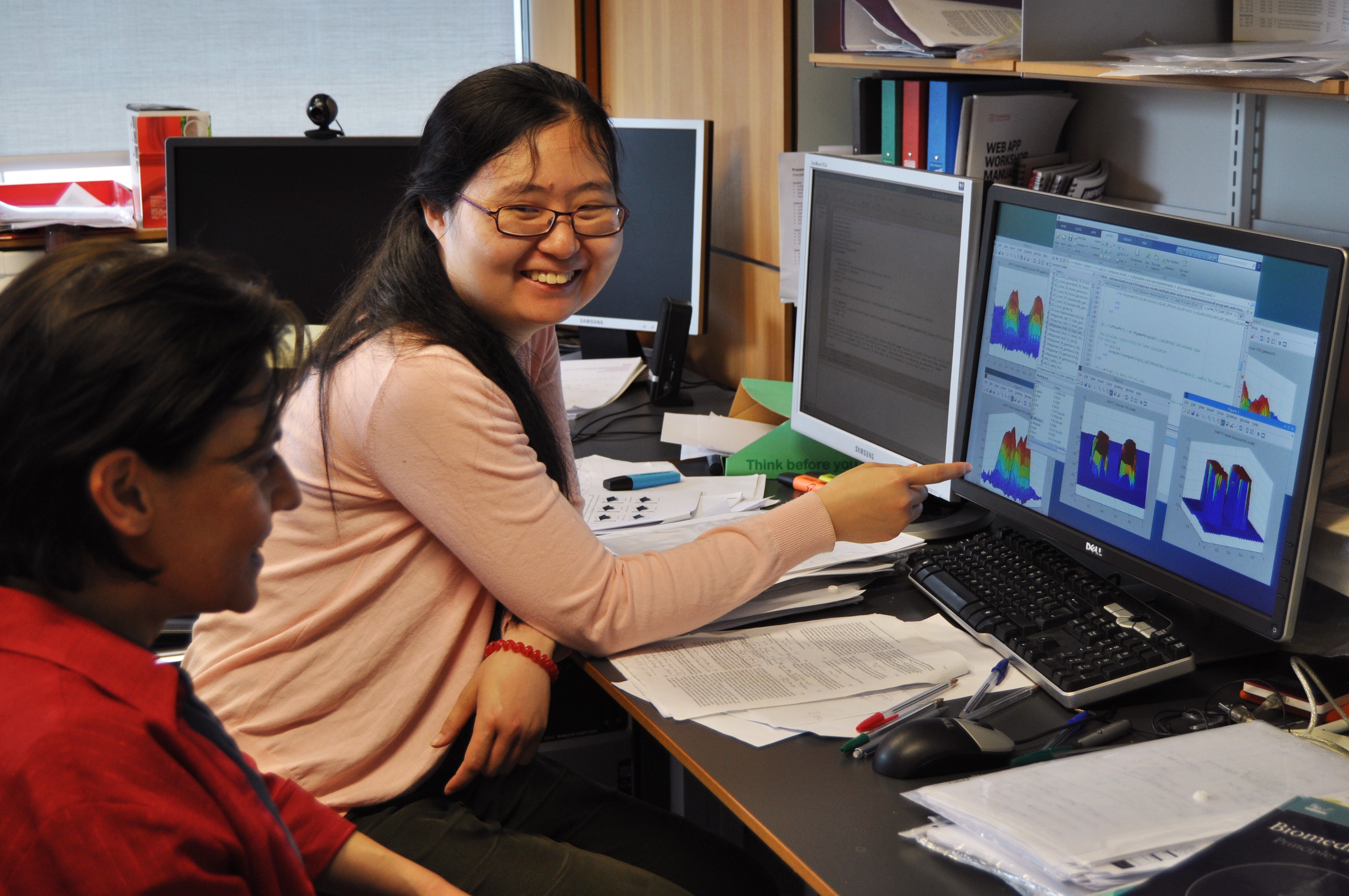
Orsola Rath Spivack first studied for an undergraduate degree in Physics in Milan. After teaching Mathematics and Physics and an initial period of research in statistical physics, first in Milan, then at Tel-Aviv University, she came to the UK to study for a PhD in Applied Mathematics and later joined the Cavendish Laboratory as a Research Assistant working on Diffusion Limited Aggregates. After a career break to look after her young family, she joined the (e,2e) Research Group in DAMTP and Lucy Cavendish College in 1995 with a Daphne Jackson Research Fellowship and was subsequently Lu Gwei Djen Research Fellow. She was Graduate Tutor in Lucy Cavendish from 1999 until 2015, before becoming Faculty Admissions Officer in the Maths Faculty. Her current research interests centre on acoustic and electromagnetic wave scattering from rough surfaces, especially methods for large systems and inverse scattering problems. She has a particular interest in regularisation methods for inverse problems and applications to hybrid methods for medical imaging. Other ongoing research concerns propeller noise, and the interaction between the acoustic field and various structures, such as ship hulls and oil platforms. She is pictured with her PhD student Yujun Qiao.
Past members
Mary Cartwright (1900-1998)
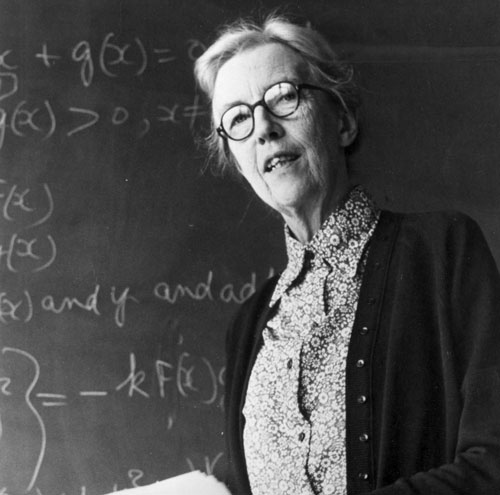
Mary Cartwright started as a research Fellow in Cambridge in 1930, and became Director of Studies at Girton in 1936. She was appointed Mistress of Girton from 1948 then, in addition, was appointed a Reader in the Theory of Functions in Cambridge in 1959, holding this post until 1968.
She was the first female mathematician
- to receive the Sylvester Medal
- to be elected to be a Fellow of the Royal Society (1947)
- to serve on the Council of the Royal Society
- to be President of the London Mathematical Society (in 1961–62)
She also received the De Morgan Medal of the Society in 1968.
Philippa Fawcett (1868-1948)
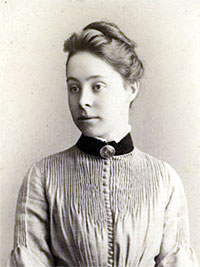
Philippa Fawcett was awarded a Gilchrist Scholarship to study Mathematics at Newnham College and obtained the highest mark of all the candidates for the Mathematical Tripos in 1890. In those days women were not eligible for a Cambridge degree and could not be classed as Wranglers, so when her name was read out in the separate women's list, she was classed 'above the Senior Wrangler'. She went on to be a College Lecturer in Mathematics at Newnham for 10 years, then was elected a Fellow of University College London, before moving to South Africa as a Lecturer to train Maths teachers, then coming back to England to take a position in the administration of education for London County Council, where she attained the highest LCC rank ever for a woman, in her work developing secondary schools.
Susan Howson
Susan Howson received her Ph.D. in mathematics from the University of Cambridge in 1998 with a thesis titled 'Iwasawa Theory of Elliptic Curves for p-Adic Lie Extensions' under the supervision of John H. Coates. In 2002 she became the first women to win the Adams Prize, for her work on number theory and elliptic curves. The Adams Prize is awarded each year by the Faculty of Mathematics and St. John’s College to a young researcher based in the United Kingdom who is doing first-class international research in the mathematical sciences. Susan has taught and worked at MIT, University of Cambridge, University of Oxford, University of Nottingham and the Université de Paris 13 and held a Royal Society Dorothy Hodgkin Research Fellowship.
